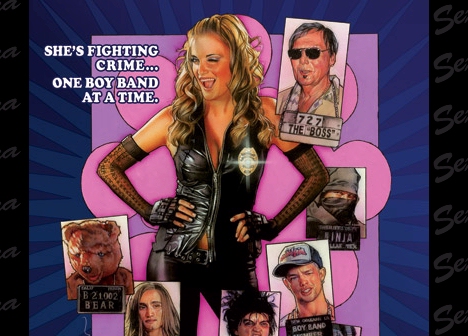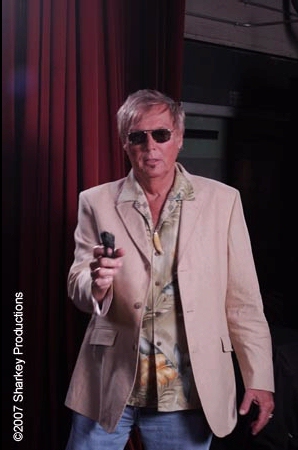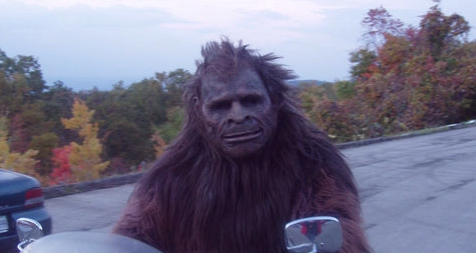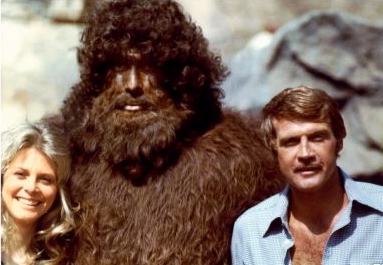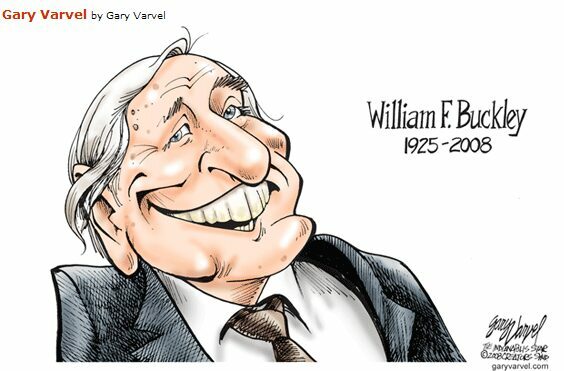
"Part of me thinks he actually died a long time ago," one blog reader commented, "like maybe the day Rush Limbaugh was awarded the inaugural 'William F. Buckley, Jr. Award for Media Excellence,' by the Media Research Center."
But Buckley always remained his own man, infuriating some neo-conservatives with his independence from their movement. As his smooth genial personality watched over the decades, Buckley observed conservatism in many flavors. There was ultimately nothing unusual about the moment when he called on George Bush to admit the war in Iraq was lost, since Buckley had consistently engaged virtually every social issue in the lifetime that preceded it.
1. Secret Agent Man
Buckley didn't just support the cold war — he actually participated in early CIA actions. In 1951 he became a deep cover CIA agent stationed in Mexico, reporting directly (and only) to E. Howard Hunt (who would later play a role in the Bay of Pigs invasion). Two years before his death, 79-year-old Buckley remembered a strange aftermath to his CIA work more than half a century before:
In 1980 I found myself seated next to the former president of Mexico at a ski-area restaurant. What, he asked amiably, had I done when I lived in Mexico?
Buckley's honest answer? "I tried to undermine your regime, Mr. President."
"It was three months before I was formally permitted to inform my wife what the real reason was for going to Mexico City to live," Buckley later remembered. And in 1986, Howard Hunt affectionately dedicated his spy novel Cozumel, to Buckley: "...como recuerdo de nuestra temporada en Mexico."
2. Yeah Yeah Yeah, They Stink
Throughout his life Buckley continued taking staunchly conservative positions, railing against desegregation in the 1950s and criticizing Nixon for going to China in the 1970s. But as a cultural critic, Buckley also injected himself into smaller controversies. "Beatle Hater William F. Buckley Dead At 82," read one post in the newsgroup rec.music.beatles. In a 1964 essay titled "Yeah Yeah Yeah, They Stink," Buckley had written that the Beatles were not merely awful: "I would consider it sacrilegious to say anything less than that they are godawful." His diatribe acknowledged the National Review critic who argued that after Sinatra's twitches and Elvis's thrusts, future entertainers would have to wrestle live octopuses. "The Beatles didn't in fact do this," Buckley wrote, "but how one wishes they did!"
"And how one wishes the octopus would win."
But behind Buckley's wit was at least the appearance of fair play, and the essay ends with him knowingly mocking the horror of parents. "What was our sin? Was it our devotion to Frank Sinatra, Judy Garland, Ella Fitzgerald? We worshiped at the shrine of purity..."
In fact, Buckley was a genuine music lover, and when it came to Elvis Presley, Buckley had always defended him. In 2002, at the age of 77, Buckley even wrote historical fiction about the life of the pop star called Elvis in the Morning. "Ninety five percent of what he sang, in my judgment, is simply awful," he told one interviewer. "But five percent is just terrific. He was a great, great balladeer and his sense of music and his sense of rhythm was fantastic." Unfortunately, despite his genuine enthusiasm, Buckley's final novel drew mixed reviews. "This lackluster affair is filled with so little energy that one suspects that the author was as bored as his readers will be," wrote The Library Journal. "It's hard to imagine someone making Elvis and the 1960s and 1970s uninteresting, but Buckley succeeds beyond all reasonable expectations."
Today used copies are for sale on Amazon for one cent.
3. "Go Back To Your Pornography"
As the sixties heated up, Buckley made one of his most notorious statements. It was during a live television discussion about a police crackdown on demonstrators at the 1968 Democratic convention in Chicago. Gore Vidal and Buckley were in absolute disagreement about the meaning of the clashes, with Buckley arguing there was a legal right to disperse the demonstrators. Vidal cited the support for North Vietnam in parts of Europe, and invoked the importance of freedom of speech in America. "Shut up a minute," Vidal said, as Buckley tried to interrupt.
"No I wont," Buckley replied — and then the debate got complicated. Addressing the question of how to handle dissenters, Buckley said "Some people were pro-Nazi, and the answer is they were well-treated by people who ostracized them. And I'm for ostracizing people who egg on other people to shoot American marines and American soldiers. I know you don't care."
Gore Vidal: As far as I'm concerned, the only sort of pro-crypto-Nazi I can think of is yourself.
William F. Buckley: Now listen, you queer, stop calling me a crypto-Nazi, or I'll sock you in your god damn face and you'll stay plastered.
Citing Vidal's book, Myra Breckinridge, Buckley suggested his opponent "Go back to his pornography." Buckley also cited his military service in World War II, which Vidal accused him of exaggerating. There were real bad feelings, though ultimately Buckley himself admitted he was deeply embarrassed about losing his composure.
Buckley remained the best of friends with an equally liberal writer, Norman Mailer, and Playboy magazine once published the transcript of a good-spirited debate between the two. (Buckley embarrassed Mailer by citing an earlier essay where he'd discussed the pursuit of the perfect orgasm...)
For 33 years Buckley held court for intellectual discussions on his talk show, Firing Line, where he gamely engaged the cultural figures of his time, including one legendary interview with Jack Kerouac just one year before the author's death in 1968. Apparently under the influence of an intoxicating substance, Kerouac blurts out "Flat foot floosie with a floy floy" at one point — and the interview was later lovingly recreated in a 2006 stage play.
4. Cigarette Smoking Man
At the time of his death, Buckley was suffering from emphysema, and 14 months earlier (at the age of 82) he penned a remarkable editorial against tobacco. Buckley first turned his witty style against cigarette advertising, skewering Newport cigarettes' claim that they're "alive with pleasure." ("The ads, of course, took no account of those who were dead, presumably without pleasure.") His wife had died the year before, after 57 years of marriage, "technically from an infection," Buckley wrote, "but manifestly, at least in part, from a body weakened by 60 years of nonstop smoking."
My wife began smoking (furtively) when 15, which is about when I also began. When we were both 27, on the morning after a high-pitched night on the town for New Year's Eve, we resolved on mortification of the flesh to make up for our excesses: We both gave up smoking.
The next morning, we decided to divorce — nothing less than that would distract us from the pain we were suffering. We came to, and flipped a coin — the winner could resume smoking. I lost, and for deluded years thought myself the real loser, deprived of cigarettes.
Buckley had defended the free market his whole life, but felt a sadness over his years of silence on the dangers of tobacco, which "puts me in something of the position of the Zyklon B defendants after World War II... They pleaded, of course, that as far as they were concerned, they were simply technicians, putting together chemicals needed in wartime for fumigation... Those who fail to protest the free passage of tobacco smoke in the air come close to the Zyklon defendants in pleading ignorance."
5. Sailing Away
Buckley famously smoked marijuana — after sailing his boat outside the U.S. territorial limits, where it would no longer be illegal. Finally at the age of 78, Buckley wrote an editorial for the National Review decrying the war on pot.
"Legal practices should be informed by realities," Buckley argued, citing 700,000 pot arrests each year, 87% of which involved only possession of small amounts. "This exercise in scrupulosity costs us $10-15 billion per year in direct expenditures alone."
But would America ever rise up and demand a change in marijuana laws?
It is happening, but ever so gradually. Two of every five Americans, according to a 2003 Zogby poll cited by Dr. Nadelmann, believe "the government should treat marijuana more or less the same way it treats alcohol: It should regulate it, control it, tax it, and make it illegal only for children". The Dutch do odd things, but here they teach us a lesson.
Buckley's position was unexpected, but it offered an honorable example of his real commitment to intellectualism. He began his essay by writing that "Conservatives pride themselves on resisting change, which is as it should be. But intelligent deference to tradition and stability can evolve into intellectual sloth and moral fanaticism, as when conservatives simply decline to look up from dogma because the effort to raise their heads and reconsider is too great."
His son said Buckley died "with his boots on," according to BBC News — writing at his desk. "If he had been given a choice on how to depart this world," the National Review wrote, "I suspect that would have been exactly it. At home, still devoted to the war of ideas."
See Also:
20 Secrets of an Infamous Dead Spy
Prescription Ecstasy and Other Pipe Dreams
The QuestionAuthority Proposal
The Furious Passions of Norman Mailer
